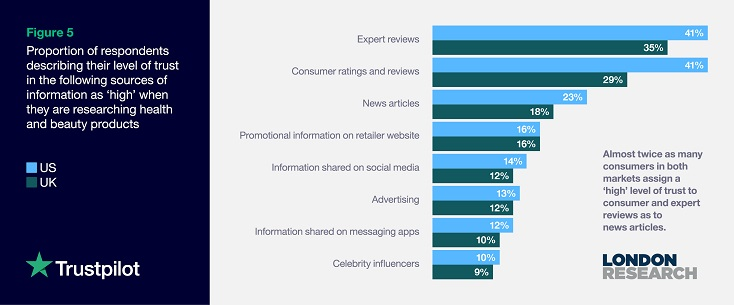Combating Misinformation in the Health and Beauty Sector
Consumers have increased their spending on both health and beauty products as a result of the Covid crisis, but they are also falling victim to the growing amount of misinformation and fake reviews when buying online. These are among the key findings from a new report by Digital Doughnut sister company London Research in partnership with Trustpilot. How can people ensure they are buying legitimate products and what can respectable brands do to communicate the quality and trustworthiness of their products?

The Combating Misinformation in the Health and Beauty Sector report looks at the impact of the coronavirus pandemic on consumer behaviour and what this means for retailers.
As might be expected, consumers in both the UK and US have increased their spending on health products this year, with hand sanitiser, disposable gloves and face masks all flying off the virtual shelves as people try to ensure they stay healthy.
Perhaps more surprisingly, consumers have also spent more on beauty-related products as they seek to treat themselves and stock up on their favourite items while lockdowns and social restrictions have been place.
These are findings from separate surveys of 1,000 consumers in both the UK and US in April 2020, while both countries were under lockdown. London Research also carried out a series of interviews for this report to explore the problem of misinformation and fraudulent reviews, and how brands can combat this.
The research shows that the average Briton spends £24 per month on health products and £25 on beauty products – £593 combined per year.
On average, it is estimated that UK consumers waste £25 per year on poor-quality or fake products, as well as almost £20 on goods bought on the recommendation of fake reviews. This equates to 7.6% of overall spend and £752m of yearly waste.
Meanwhile Americans are each spending around $48 per month on health products and $40 on beauty goods, a combined annual spend of $1,057. American consumers estimate they waste $44 per year on poor-quality or fake goods and just under $40 on unsatisfactory goods, based on fake reviews. This equates to 7.9% of overall spend and $7.1bn wasted annually. That's an enormous amount of money down the drain.
Consumers need to be more cautious
Wellness and beauty industry influencer Gina Akers told London Research that many consumers, especially young people, want to look like their favourite celebrity, but cannot afford the high-end prices required. With reputable stores running out of stock, this has given counterfeiters a huge opportunity.
“The big issue is the celebrity influencers have their own lines of cosmetics which are high end and are prone to running out of stock, particularly with the supply problems around coronavirus,” she says.
“Young people wanting to look like these celebrities are sorely tempted to get something cheaper from somewhere online that claims to have stock. But they’re often fake and, even worse, they have been made in unsanitary conditions. My advice is that if it’s too good to be true, it probably is. Always buy from a reputable store.”
The research also found that a third (33%) of American and 29% of British consumers are more cautious about the products they purchase because of online misinformation relating to health and beauty products. This can include fake or inaccurate reviews, dubious and exaggerated claims about the product’s benefits, and even dangerous lies about its contents.
Who do consumers trust?
According to the chart from the report shown below, customer and expert ratings and reviews are the preferred sources of information for a significant proportion of consumers when they are researching health and beauty products.
In spite of the issue of fake reviews in the marketplace, reviews are assigned the same level of ‘high’ trust (41%) by US consumers, whether they come from consumers or from experts.
Reviews are also the most trusted source of information in the UK. Britons are slightly more likely to trust experts over fellow consumers (35% versus 29%). Nearly twice as many consumers in both markets assign a ‘high’ level of trust to consumer and expert reviews as to news articles.
Another finding from the research is that celebrity influencers have the lowest level of trust among consumers. Two-thirds (67% in the US and 65% in the UK) describe their level of trust in this source of information as ‘low’.

What can retailers do to build trust?
The report examines how retailers can demonstrate their trustworthiness and show that their products are genuine and high-quality. Showcasing customer approval stands out as the most effective way to achieve ‘social proof’ authentically.
According to Tim Peckover, Content Marketing Manager at brand loyalty business Smile.io, the power of customer testimonials lies not just in what they say about a company’s products, but also the brand itself.
“Reviews are powerful for health and beauty brands because of the social proof they attach not just to the brand, but to the quality of the products as well.”
He adds: “In today’s ecommerce world, health and beauty shoppers don’t just look for a fun and engaging brand, they also want products that are going to give them the results they want. Shoppers are looking for health and beauty brands that will become their go-to, and customer reviews show them how loyal other customers already are, and help turn potential shoppers into long-term brand advocates.”
You can read the report in full here on the Trustpilot website.